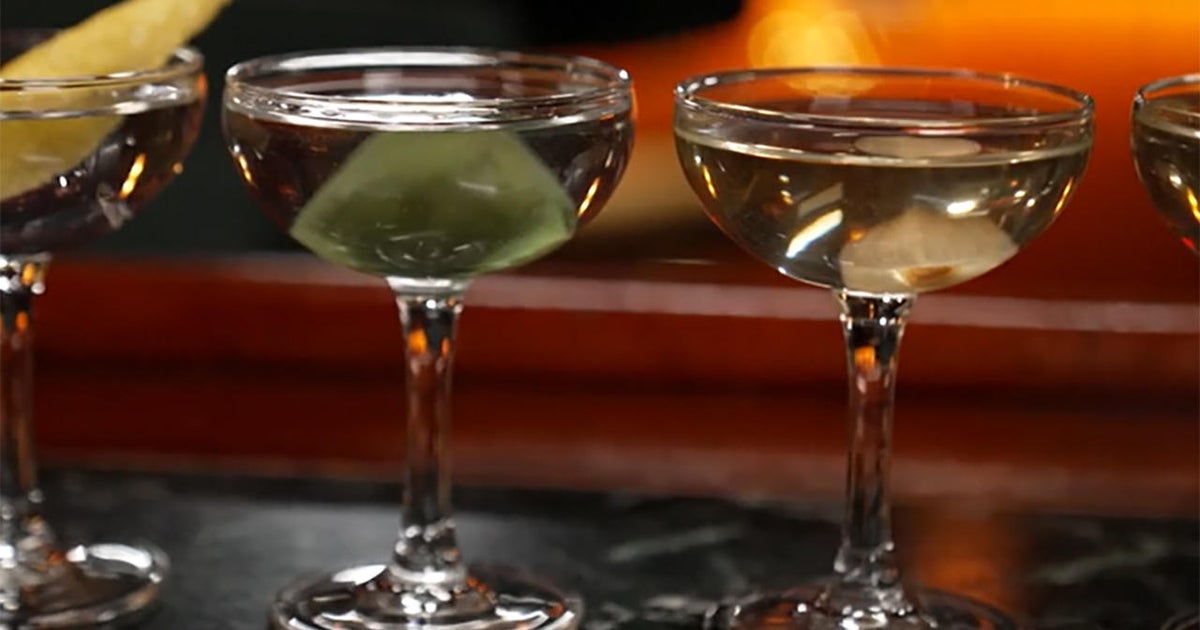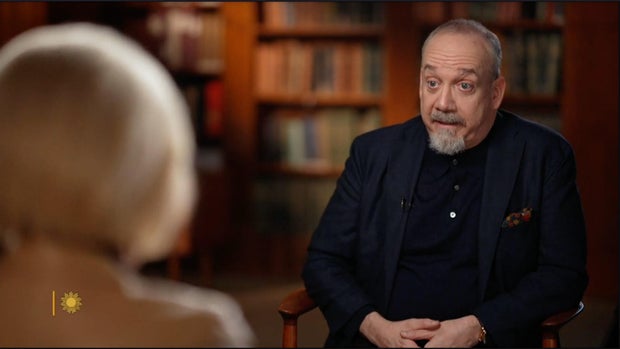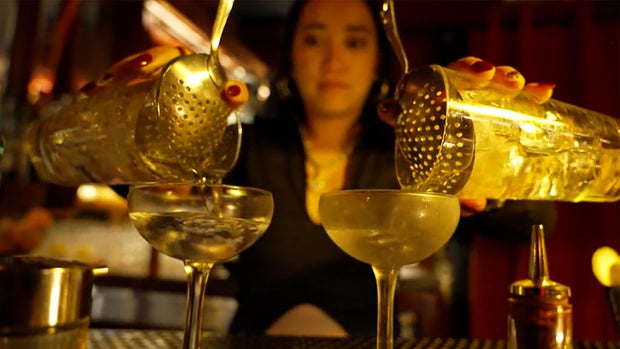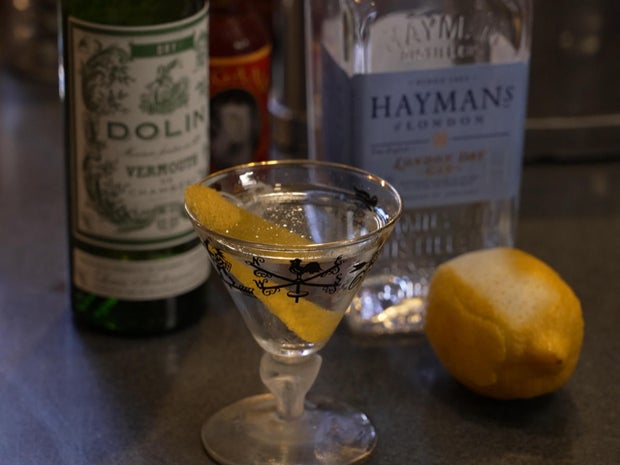CBS News
Paul Giamatti, 2024 Oscars nominee for “The Holdovers”

Difficult characters are a Paul Giamatti specialty. He’s portrayed a cantankerous John Adams and a brutal U.S. Attorney in “Billions,” and, in his latest movie, “The Holdovers,” Giamatti plays Paul Hunham, a bitter teacher at a New England boarding school.
Hunham is in charge of the students with nowhere to go at Christmas, and he forms a bond with a rebellious kid and the school’s grieving cook, played by Da’Vine Joy Randolph, whose deceased son attended the school.
People have described the movie as a “Scrooge-like Christmas story,” with Giamatti being Scrooge. He thinks that’s apt.
“It has a ‘Christmas Carol’ thing,” Giamatti says. “I think all three of the characters are Scrooge a little bit. They all need to kind of move out of a place that they’re stuck in.”
The 56-year-old’s performance has earned him a nomination for best actor at the Oscars, and Critics Choice and Golden Globe awards. After his win at the Golden Globes, Giamatti says he took his award to a burger place before going out to parties and “fancy things.”
Giamatti’s role in “The Holdovers” was written for him.
CBS News
“There’s times when I think, ‘Why was this written specifically for me, a man who smells like fish that nobody likes?'” he says. “Then I look at it and go, ‘I think I know.'”
One reason: Giamatti, raised in Connecticut, attended a prep school himself.
“Most of it was pretty familiar to me,” he says of “The Holdovers.” “I had teachers like this guy. I think those schools are different now, but I had teachers that were the sort of strict, disciplinarians like this.”
He was not a troublemaker in school, although Giamatti admits he would cut classes to read in the library on his own. That bookishness ran in the family, as Giamatti’s mother, Toni, was a teacher, and his dad, Bart, was once president of Yale University and, later, Major League Baseball Commissioner.
Giamatti didn’t act professionally until after he’d graduated from college, although he “did it as an extracurricular thing” before then. He began his professional career in plays and, later, movies.
“I started making a very small living at it,” he says. “But I was deceived into thinking, ‘Oh, I can do this. This is not too bad.’ So, I think that’s when I went, ‘I should just do this. This is what I love to do.'”
Giamatti had one scene in his very first movie, a slasher called “Past Midnight,” which he says he’s never watched. After that, he quickly landed small roles opposite some big names in major films like “My Best Friend’s Wedding” and “Saving Private Ryan.”
He has a biopic to thank for his big break. It was about Howard Stern, and Giamatti played his put-upon corporate handler, Kenny “pig vomit” Rushton.
“It was a fantastic role,” says Giamatti. “It is an incredibly energetic and kind of crazy role with lots of latitude to do crazy things.”
Giamatti is known for playing curmudgeons, and he doesn’t mind his work being described that way.
“I often think that, really, I just play kind of complicated people. People with a complicated relationship to the world,” he says. One such character was Miles Raymond, the boozy failed writer and wine snob in the Academy Award-winning movie “Sideways.”
Outside of acting, Giamatti records a podcast called “Chinwag” and plays the theremin in his free time.
“I feel like every theremin player in the world is so insulted by what I do,” he says while recording “Chinwag” for an audience at the S.F. Sketchfest. Giamatti explains on “Sunday Morning” that his interest in “strange things” and “weird topics,” from UFOs to Big Foot and beyond, is why he does the podcast.
Looking back on all of the roles he’s played so far, one of Giamatti’s favorites was a part where he played no human at all. He played an orangutan, which, he says, “was really fun.”
“And so I was completely transformed, which, for an actor, is great,” he recalls. “I’d look in the mirror and I was gone.”‘
Giamatti says he cannot explain exactly why actors like himself may be drawn to “hiding” behind their roles.
“It’s a very strange way of connecting with other people. It’s very weird,” he says. “But I actually think it’s a good thing. I enjoy being weird. It’s OK to be weird. Weird is all right.”
Produced by Reid Orvedahl and Kay M. Lim. Edited by Carol A. Ross.
CBS News
What makes a martini a martini?

Watch CBS News
Be the first to know
Get browser notifications for breaking news, live events, and exclusive reporting.
CBS News
What makes a martini a martini?

Nowadays, what makes a martini a martini? Robert Simonson, who wrote a book about the martini, said, “It’s funny: it’s strict and loose at the same time.”
Ten Speed Press
Everyone seems to have an opinion about the cocktail: “Ingredients, proportions, garnishes – it’s all subject to debate,” Simonson said. “I’m a purist. I would think it needs to be gin and vermouth. But I’m willing to bend and say, ‘Okay, vodka and vermouth as well.’ [However,] if there’s no vermouth in there, I don’t know how you can call it a cocktail.”
Simonson says the martini was probably named after a vermouth company. It was invented in America in the 1870s or ’80s when bartenders mixed gin with vermouth, a fortified wine made with herbs and spices. “It’s a very big player in cocktail history,” he said.
In the early 20th century, the “very-dry” martini became very-popular: Ice cold gin or vodka, garnished with a lemon twist, or an olive, or an onion, but only a little vermouth (or maybe not even a little).
Samantha Casuga, the head bartender at Temple Bar in New York City, says the reason why many people might not want vermouth in their martini is because, for years, vermouth was stored improperly. “It should be in the fridge,” she said.
CBS News
Casuga’s classic martini is two parts gin, one part vermouth, with a twist of lemon. She suggests that you probably shouldn’t order it the way James Bond does – shaken, not stirred. Casuga says she’s always stirring, but some people like the show behind the bar when a bartender shakes their cocktail. “Definitely, people love a good shake,” she said.
People also love to have a martini made just the way they want it. But Casuga understands why they might be so specific: “To have your own preferences, not only listened to and then executed, is, like, that’s luxury itself.”
Writer Robert Simonson says that a martini can also add a little luxury to your Thanksgiving. “It actually makes very good sense for Thanksgiving,” he said. “It will whet your appetite for the meal to come.
“There are very few American inventions more American than the martini. So, an American holiday, American drink.”
CBS News
For more info:
Story produced by Mary Raffalli. Editor: Remington Korper.
“Sunday Morning” 2024 “Food Issue” recipe index
Delicious menu suggestions from top chefs, cookbook authors, food writers, restaurateurs, and the editors of Food & Wine magazine.
CBS News
NATURE: Turkeys in South Dakota

Watch CBS News
Be the first to know
Get browser notifications for breaking news, live events, and exclusive reporting.












